Charge Ahead Partnership first became involved in Minnesota when Northern States Power Company-Minesota, doing business as Xcel Energy, filed one of the most aggressive utility-owned electric vehicle (EV) charging proposals to date. In August of 2022, Xcel submitted a petition to the Minnesota Public Utilities Commission for approval of a public charging network that would see the utility own and operate more than 700 direct current fast charging (DCFC) stations using almost $200 million in ratepayer funds. Xcel initially wanted to see this proposal evaluated through its regular rate case; however, after comments and testimony from CAP and several other concerned groups, the Commission elected to evaluate the proposal through a separate and contested proceeding, Docket 22-432. CAP continued to advocate, raise awareness and track this proceeding until Xcel requested to withdraw the proposal on June 1, 2023, which CAP supported through additional comments.
Minnesota saw one of the country’s largest rate-basing requests to date:
Xcel Energy petitioned the PUC for almost $200 million in ratepayer funds to build more than 700 DCFC chargers.
This would have stifled private investment in Minnesota’s EV charging network as private entities cannot compete with the advantages of regulated monopolies.
Xcel withdrew this request after significant public pressure and media coverage.
On the legislative front, in 2023 CAP opposed Minnesota HF 413 and Minnesota SF 1296, two bills which contained extremely concerning language regarding the capabilities of electric utilities to build and own EV chargers using ratepayer funds. These bills would have required utilities to submit Transportation Electrification Plans (TEPs) every three years which could include proposals to build utility-owned chargers and enable utilities to recoup the costs of the installation and operation of the EV chargers by spreading the costs to electric customers. While electric utilities would still be required to submit their plans to the Public Utilities Commission for approval, these bills not only encouraged utility ownership of EV chargers but also provided the legislative authority to rate-base the construction and operation of these chargers. While these bills did not pass, the concerning language was ultimately included in a large omnibus bill, HF 2310, which the governor signed into law. Amendments made to the legislation added language encouraging partnerships with existing fuel retailers in the TEPs, a small step in the right direction. When the first TEPs were proposed in November, 2023 there were no requests for funding to own and operate additional EV charging stations, indicating the success of the advocacy against Xcel’s public charging network proposal.
CAP also submitted comments to the Commission in Docket No. CI-22-267, a docket considering measures to promote greater electrification of the transportation sector under the Federal Infrastructure Investment and Jobs Act (IIJA) of 2021, and the Public Utility Regulatory Policies Act (PURPA) Amendments implemented by the IIJA. For more information on the PURPA Amendments, view the PURPA Amendments blog post. CAP’s comments encouraged the Commission to adopt policies to drive the growth of the EV charging network by preventing unfair competition from electric utilities and addressing demand charges, two key barriers to private investment. The Commission order found that ongoing commission action aligned with the federal standards and that declining to adopt the standards would provide greater flexibility to consider and implement measures best suited for Minnesota’s specific situation.


